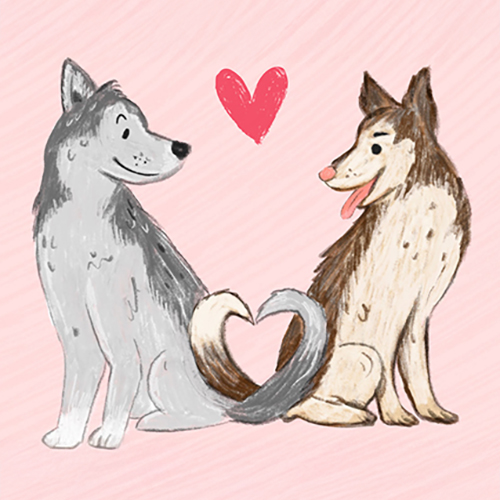When Allan and Mary Kollar met as teachers at Bothell High School in the 1970s, Allan taught art and Mary taught English. They knew little about each other’s fields, but over time they discovered intriguing connections between the two disciplines. Before long, Mary (BA, Education, 1965; MAT in English,1982) was taking her writing students to museum exhibitions to teach "point of view," and Allan (MFA, Art, 1975) was referencing authors like Edith Wharton and Henry James when speaking about American art.
To encourage UW students to make their own connections between art and literature, the couple established the Allan and Mary Kollar Endowed Fellowship. The fellowship supports graduate students from the Department of English and the School of Art + Art History + Design whose research intersects the fields of American literature and American art history. More than a dozen students have benefited from the fellowship since 2004, applying the funds toward tuition, travel, or other expenses.
“The Kollar Fellowship will truly open doors for my scholarship,” says current fellow Daniel Griesbach, a doctoral student in English whose dissertation explores farmworker history through the photography of Dorothea Lange and the writing of American novelists John Steinbeck, Raymond Barrio, and Helena Maria Viramontes. Thanks to the Kollars’ support, Griesbach is planning a research trip to California to visit the Center for Steinbeck Studies at San Jose State University and the Oakland Museum, which holds the largest collection of Lange’s photographs, field notes, and correspondence.

Kimberly Hereford (PhD, Art History, 2014) also used her Kollar Fellowship to travel. At the Smithsonian American Art Museum in Washington, DC, Hereford viewed primary documents that could not be accessed any other way. “As any scholar knows, there is nothing like going through primary documents,” she says. “The Kollar Fellowship made it possible for me to spend many, many hours in the Smithsonian’s vast archives, which led to several serendipitous moments of new insight. My research took shape during this period. I also wandered the museum’s galleries to see the artworks in person, which is essential for an art historian.”
Hereford discovered another benefit of the fellowship: Mary and Allan Kollars’ mentorship. Allan left teaching years ago to become one of the nation’s most respected American art collectors and dealers, and he and Mary regularly invite students into their home to view their collection and discuss American art. They also share their influential art world contacts and write recommendation letters when past and current Kollar Fellows seek jobs related to American art.
“It’s easy to recommend them because the level of the students has been top notch,” says Allan. “It says a lot for the future of the University.”
The Kollar Fellowship made it possible for me to spend many, many hours in the Smithsonian’s vast archives.... My research took shape during this period.
The Kollars’ mentorship often continues long after students earn their PhDs. Kollar Fellow Melanie Enderle (PhD, Art History, 2012), who now lectures at several Puget Sound colleges, has tapped Allan to speak in her classes and asks for Mary and Allan’s input on projects. “I know I can pick up the phone and say, ‘I’m working on a new project. Do you want to get involved?’” says Enderle. “They’ve never said ‘no’ to any proposals I suggest related to students. They’re just teachers at heart.”
Hereford, now a fine art appraiser, still meets with Allan for early morning coffee, as she has done since her fellowship days. “As the years passed, the conversations have evolved accordingly,” says Hereford. “For example, Mary was right there with me as I discussed my dissertation topics, beaming and sharing her own insight on the rich intersection between American art and literature. As I explored various career options, Allan was critical in opening doors and providing his invaluable insight in the world of American Art. Their passion and commitment is infectious.”
That passion and commitment has led the Kollars to establish another UW endowment, the Allan and Mary Kollar Endowed Chair in American Art History, and to plan a UW-Seattle Art Museum fellowship that will support graduate student internships at the museum. All of their gifts have taken shape through conversations with College of Arts and Sciences advancement staff.
“What I like about advancement at the UW is that they don’t come with a mission that they’re trying to push,” says Mary. “They come to find out what you care about and how to make that happen. Those conversations are a chance to discover what we want to do.”
What they want to do, simply put, is share their love of American art and literature. And they have done so brilliantly.
“When I received the amazing news that I received the Kollar Fellowship, it cultivated a sense of confidence and helped to establish a clear path for my future study in American art,” says Hereford. “My fellow grads have taken various career routes, but I know that we are all very proud to say we were Kollar Fellows.”
. . .
Support the Allan and Mary Kollar Endowed Fellowship.
More Stories

Finding Love at the UW
They met and fell in love as UW students. Here, 10 alumni couples share how they met, their favorite spots on campus, and what the UW still means to them.

AI in the Classroom? For Faculty, It's Complicated
Three College of Arts & Sciences professors discuss the impact of AI on their teaching and on student learning. The consensus? It’s complicated.

Bringing Music to Life Through Audio Engineering
UW School of Music alum Andrea Roberts, an audio engineer, has worked with recording artists in a wide range of genres — including Beyoncé.